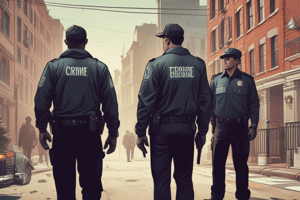Podcast
Questions and Answers
What are durable relationships in the context of community policing?
What are durable relationships in the context of community policing?
- Relationships that are strong, lasting, and endure through the pressures and changes of life, family, and neighborhood (correct)
- Relationships that are only focused on crime suppression and enforcement
- Relationships that are primarily virtual and not based on physical interactions
- Relationships that are temporary and easily influenced by external factors
In the Mobilization and Engagement Model of Community Policing, what does the red zone signify?
In the Mobilization and Engagement Model of Community Policing, what does the red zone signify?
- Neighborhoods where police rarely have to respond
- Neighborhoods with low levels of victimization and minimal crime
- Neighborhoods with moderate levels of victimization and crime
- Neighborhoods with high levels of victimization, high crime, and social disorganization (correct)
What is the primary focus of community policing in the green zone according to the Mobilization and Engagement Model?
What is the primary focus of community policing in the green zone according to the Mobilization and Engagement Model?
- Minimizing community engagement and interaction
- Targeted enforcement and crime suppression
- Identifying individuals, groups, and organizations to provide support and solve social disorder (correct)
- Responding to frequent police calls and incidents
What characterizes neighborhoods in the amber zone according to the Mobilization and Engagement Model?
What characterizes neighborhoods in the amber zone according to the Mobilization and Engagement Model?
What is community capacity building?
What is community capacity building?
What does police legitimacy refer to?
What does police legitimacy refer to?
What are criminogenic factors?
What are criminogenic factors?
What is social capital?
What is social capital?
What does procedural justice refer to?
What does procedural justice refer to?
What are durable relations?
What are durable relations?
What is recidivism?
What is recidivism?
What is community cohesion?
What is community cohesion?
What are the three types of neighborhoods described in the text?
What are the three types of neighborhoods described in the text?
What are the sources of social control mentioned in the text?
What are the sources of social control mentioned in the text?
What does social capital refer to in the context of the text?
What does social capital refer to in the context of the text?
What is the role of the police in community policing, as mentioned in the text?
What is the role of the police in community policing, as mentioned in the text?
What factors does the community index measure, as mentioned in the text?
What factors does the community index measure, as mentioned in the text?
What is recidivism in the context of the text?
What is recidivism in the context of the text?
What are the social determinants of safety, as described in the text?
What are the social determinants of safety, as described in the text?
Which organizations are involved in community policing, according to the text?
Which organizations are involved in community policing, according to the text?
What does community cohesion refer to, as mentioned in the text?
What does community cohesion refer to, as mentioned in the text?
In what way were Pre-Colonial Indigenous Societies organized, according to the text?
In what way were Pre-Colonial Indigenous Societies organized, according to the text?
What is the impact of social disorder on policing costs, as mentioned in the text?
What is the impact of social disorder on policing costs, as mentioned in the text?
How is police legitimacy defined in the context of the text?
How is police legitimacy defined in the context of the text?
What does problem-oriented policing involve?
What does problem-oriented policing involve?
How is police efficiency measured?
How is police efficiency measured?
What do various policing models such as SARA, PARE, and CAPRA emphasize?
What do various policing models such as SARA, PARE, and CAPRA emphasize?
In what areas are police effective according to the text?
In what areas are police effective according to the text?
What are the primary duties of police officers outlined in the Police Act?
What are the primary duties of police officers outlined in the Police Act?
What do police associations or unions negotiate collective agreements on?
What do police associations or unions negotiate collective agreements on?
In which provinces are police boards not established?
In which provinces are police boards not established?
What is an area where police performance is lacking according to the text?
What is an area where police performance is lacking according to the text?
What do police boards represent?
What do police boards represent?
What does Quebec do regarding shared police services?
What does Quebec do regarding shared police services?
What are the social determinants of health acknowledged in the text?
What are the social determinants of health acknowledged in the text?
What is an area where police perform poorly according to the text?
What is an area where police perform poorly according to the text?
What is the commonly used approach by Canadian police agencies for problem-solving?
What is the commonly used approach by Canadian police agencies for problem-solving?
What does flawed police problem analysis often result from?
What does flawed police problem analysis often result from?
What does management by consensus involve?
What does management by consensus involve?
What are the reasons for police collaboration?
What are the reasons for police collaboration?
What are the barriers to effective collaboration?
What are the barriers to effective collaboration?
What do agency representatives need to engage in for effective collaboration?
What do agency representatives need to engage in for effective collaboration?
What percentage of community-based crime prevention initiatives involved police, according to the Australian Institute of Criminology?
What percentage of community-based crime prevention initiatives involved police, according to the Australian Institute of Criminology?
What does community-based, risk-focused problem solving involve?
What does community-based, risk-focused problem solving involve?
How many principles are there for community safety planning?
How many principles are there for community safety planning?
What are the names of the community-oriented units in the London Police?
What are the names of the community-oriented units in the London Police?
What does Victim Services of Middlesex-London provide to victims of crime and tragic circumstances?
What does Victim Services of Middlesex-London provide to victims of crime and tragic circumstances?
Flashcards are hidden until you start studying
Study Notes
Community Policing and Collaborative Problem-Solving
- Traditional policing model has evolved to focus on community problem-solving and partnerships with other agencies and organizations
- SARA (Scanning, Analysis, Response, Assessment) approach is commonly used by Canadian police agencies for problem-solving
- Flawed police problem analysis influenced by factors such as insufficient time, oversimplified models, and lack of consultation with local informants
- Management by consensus involves the majority rule in decision-making
- Reasons for police collaboration include utilizing an expanded array of strategies and resources
- Barriers to effective collaboration include systemic barriers, core differences among partners, tensions, and structural shortcomings
- Agency representatives need to engage in strategic planning, develop goals, communicate often, draw on expertise, and share responsibility for funding
- Australian Institute of Criminology found that 69% of community-based crime prevention initiatives involved police
- Community-based, risk-focused problem solving involves social development, prevention, and risk mitigation
- Six principles of community safety planning include highest authority publicly announcing commitment, effective communication, collaboration, risk-focused planning, asset-based planning, and data-driven, evidence-based planning
- London Police has Community Oriented Response Unit (C.O.R.), Community Outreach & Support Team (C.O.A.S.T.), and a diversity officer
- Victim Services of Middlesex-London provides practical assistance and emotional support to victims of crime and tragic circumstances, collaborating with police and emergency service personnel.
Studying That Suits You
Use AI to generate personalized quizzes and flashcards to suit your learning preferences.





